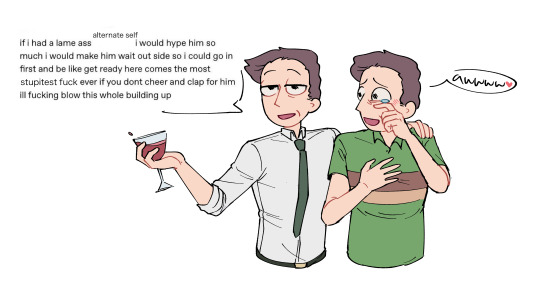Don't wanna be here? Send us removal request.
Text
OK that last post got me thinking and I think I realised why autistic Rick means so much to me:
It’s about the agency and the way he’s genuinely treated as a person rather than a human embodiment of autism
(More under the cut because this accidentally turned out very long)
Like a lot of characters who are specifically designed to be autistic or autistic-coded very much revolve around this, like they’re seen as autistic first and human second? And also another big thing that I hate about this is the way autism (and other disabilities, although I don’t think I’m really qualified to talk about them) is either infantilised or demonised, sometimes both at once. The infantilisation tends to fall into two main groups.
The first is sort of ‘oh autistic people are so good/honest/much better than us’, not in a way of ‘studies have shown that autistic people typically stick more firmly to their moral code than non-autistics’, but in a way that almost takes away our agency by suggesting that autism makes us incapable of understanding morality or the big picture, and so is suggesting that anything we do right is not a credit to us or our own choices, but simply because autistic people aren’t capable of being evil.
The other, that tends to come along with demonisation, is the idea that autism/autistic people are evil/cause suffering to those around us, but acts like this is again simply due to the autism, and doesn’t give us any control over whether we harm others or not. Even though this is obviously much harsher than the other view (e.g. parents insisting that autism is ‘taking their child’/‘destroying their family’ and acting like autism is a kind of demon possessing their child rather than an aspect of who their child is), I would argue that it still falls under infantilisation, since it treats us as if we are not responsible for this, since this is simply something intrinsically linked with autism. Maybe a better example of this might be autistic people violating clearly stated boundaries (e.g. don’t touch me) but being treated as if their autism makes them immune to criticism/unable to understand what they’ve done/unable to modify their behaviour.
So getting back to the subject of the post: autistic Rick. Rick being a morally grey character is very important for autistic representation because it helps to avoid falling into either of these two camps and most importantly, gives him agency/responsibility. He’s a grown man, and is a pretty toxic guy who’s done a lot of fucked up shit, which means he definitely isn’t going to get treated as someone inherently good/better than everyone (with the exception of some fans idolising him). However, he’s clearly shown to understand his actions, as well as right and wrong, and is making a definite choice to behave in these ways, and although his reasons for these behaviours is demonstrated, I would argue that mostly the show doesn’t allow this to justify his behaviour. I think him being older and initially having a dominant/head of household type of role also helps with this, since it’s much harder to infantilise a man who makes decisions for others and is shown to be competent in a lot of scenarios others aren’t experienced with.
Overall, I think this complexity of character is something that’s handled quite well, since generally I think the show does a good job of sympathising with characters while also criticising/pointing out their toxic behaviour, as well as giving characters moments to stand up for themselves and show their agency (e.g. The Whirly Dirly Conspiracy does a good job of exploring how Jerry is both justified in his feelings towards Rick and also simultaneously pointing out his manipulative tactics). I also think that, in general, Justin Roiland does a good job of ‘normalising’ marginalised identities and treating characters as people first, while not dismissing or ignoring the impact these have on the characters (e.g. Rick’s autism and pansexuality, as well as Terry and Korvo’s bisexuality in Solar Opposites, which gets an honourable mention here since I think it’s genuinely one of the best examples of this balance for bisexual/queer characters in media, and I also think shows a lot of Justin’s growth as a writer).
317 notes
·
View notes
Text
Ey broh! Happy 9/11!!

To celebrate both the 21st anniversary and the airing of S6E2, we decided to make a Tumblr blog!
We're looking forward to seeing and reblogging all the crazy things the Rick and Morty fandom are up to here ;)
2 notes
·
View notes


